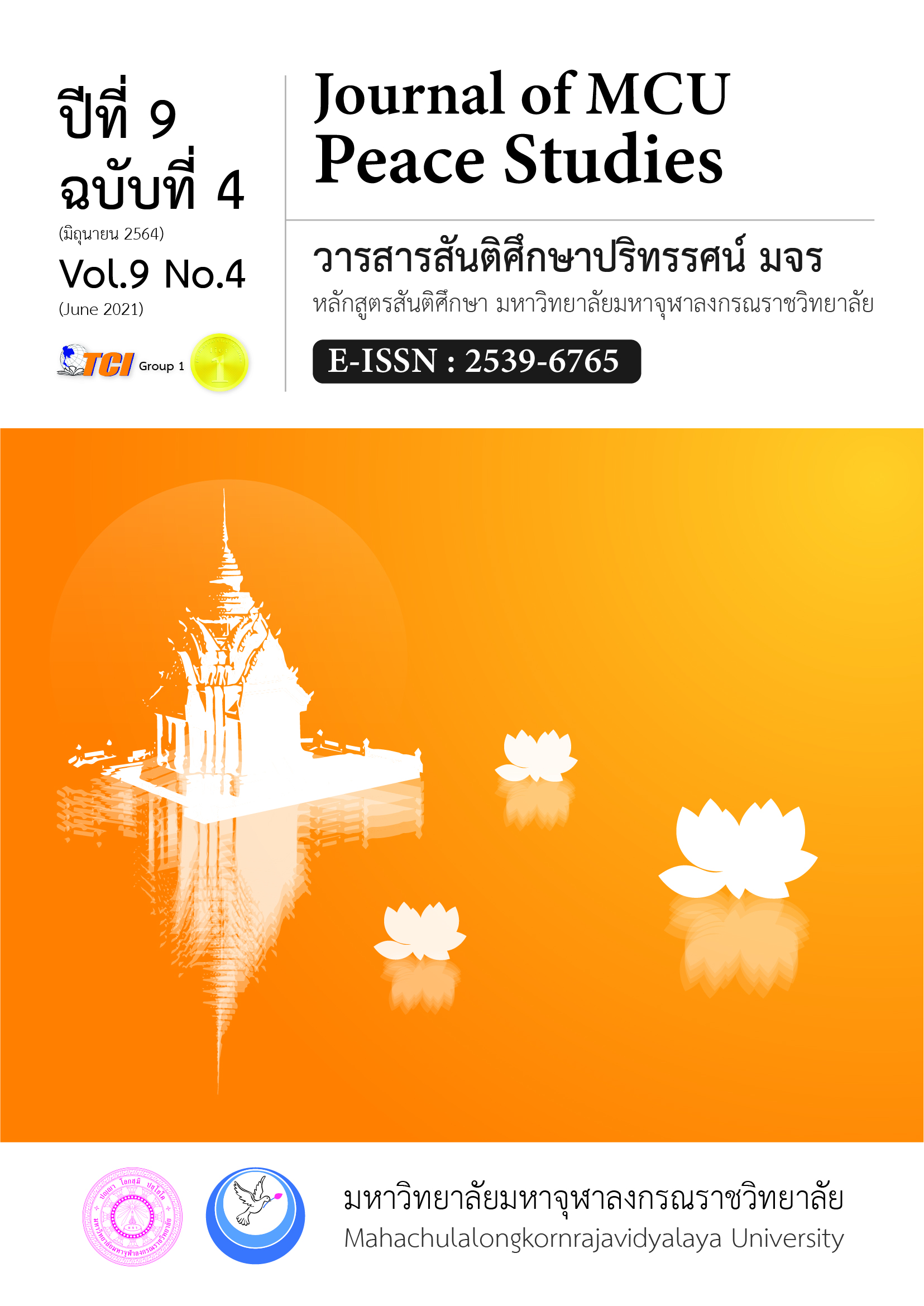ผลของกิจกรรมการเรียนรู้ที่มีสติและสมาธิเป็นฐานเพื่อพัฒนาการบริหารจัดการ ของสมองขั้นสูง ของนักเรียนชั้นมัธยมศึกษาตอนต้น โรงเรียนพรหมจักรสังวร จังหวัดลำพูน
Main Article Content
บทคัดย่อ
บทความวิจัยนี้มีวัตถุประสงค์เพื่อศึกษาผลของกิจกรรมการเรียนรู้ที่มีสติและสมาธิเป็นฐานเพื่อพัฒนาการบริหารจัดการของสมองขั้นสูง ของนักเรียนชั้นมัธยมศึกษาตอนต้น หลังเข้าร่วมกิจกรรมการเรียนรู้ที่มีสติและสมาธิเป็นฐานฯ เป็นงานวิจัยกึ่งทดลอง กลุ่มตัวอย่าง คือ นักเรียนที่เป็นสามเณรชั้นมัธยมศึกษาตอนต้น โรงเรียนพรหมจักรสังวร จังหวัดลำพูนที่ศึกษาอยู่ในภาคเรียนที่ 2 ปีการศึกษา 2562 จำนวน 30 คน ที่มีคะแนนของแบบวัดการบริหารจัดการของสมองขั้นสูงต่ำกว่าระดับเปอร์เซนไทล์ที่ 50 เครื่องมือที่ใช้ในการวิจัย คือ กิจกรรมการเรียนรู้ที่มีสติและสมาธิเป็นฐานฯ แบบวัดการบริหารจัดการของสมองขั้นสูง แบบบันทึกการเรียนรู้ และแบบสอบถามความคิดเห็นของนักเรียน ผลการวิจัย พบว่านักเรียนมีคะแนนจากแบบวัดการบริหารจัดการของสมองขั้นสูงภายหลังการทดลองสูงกว่าก่อนการทดลองที่ระดับนัยสำคัญ .05 โดยนักเรียนส่วนใหญ่มีความเข้าใจเกี่ยวกับการบริหารจัดการของสมองขั้นสูง นอกจากนั้นนักเรียนยังได้รับประสบการณ์จากการเข้าร่วมกิจกรรมจนสามารถนำประสบการณ์ทั้งหมดไปประยุกต์ใช้กับชีวิตประจำวันของตนเองได้เป็นอย่างดี
Article Details
ทัศนะและความคิดเห็นที่ปรากฏในบทความในวารสาร ถือเป็นความรับผิดชอบของผู้เขียนบทความนั้น และไม่ถือเป็นทัศนะและความรับผิดชอบของกองบรรณาธิการ ยินยอมว่าบทความเป็นลิขสิทธิ์ของวารสาร
เอกสารอ้างอิง
Chaisuwan, P. et al. (2017). Effects of Different Frequencies of Physical Activity on Executive Function in Adolescents. Journal of Liberal Arts, Prince of Songkla University, Hat Yai Campus, 9(2), 301-326.
Diamond A. (2013). Executive Functions. Annual Review of Psychology, 64, 135-168.
Haenjohn, J. et al. (2018). Development of Training Program on Promoting Executive Functions of the Brain in Adolescents. Journal of the Royal Thai Army Nurses, 19(2), 220-230.
Haenjohn, J. (2017). A Development of Executive Functions of the Brain of Adolescent by Integrative Learning Modules. Journal of Education, 28(2), 130-144.
Hanmatee, S. (2018). Guide to Developing Executive Functions in Children Ages 13-18 Years for Parents and Teachers. Bangkok: Ideol Digital Print Co.,Ltd.
Khowtrakul, S. (2016). Educational Psychology. (12nd ed). Bangkok: Chulalongkorn University Press.
Ministry of Education. (2018). Activities Guide Manual, Psychosocial Care Activities in Secondary School. Retrieved September 21, 2019, from http://www.skp.moe.go.th/index.php/download/10-2018-05-18-06-53-01.
Nathaniel R., David B., & Ritt-Olson, A. (2015). Associations between Dispositional Mindfulness and Executive Function in Early Adolescence. Journal of Child and Family Studies, 24(9), 2745–2751.
Office of the Basic Education Commission. (2019). Framework of Mindfulness & Concentration Based Learning. Retrieved September 3, 2019, from http://academic.obec.go.th/newsdetail.php?id=128
Schonert-Reichl, A., & Lawlor, S. (2010). The Effects of a Mindfulness-Based Education Program on Pre-and Early Adolescents Well-Being and Social and Emotional Competence. Mindfulness, 1(3), 137-151.
Silakhom, K., & Kaewwichit, H. (2017). The Effects of Rhythmic Dynamic Meditation on Mental Health and Emotional Intelligence of Udon Thani Rajabhat University Students. Nakhon Phanom University Journal, 7(1), 16-24.
Thangjitmatee, T. (2017). To Improve the Quality of Life by Power 5 according to Mindfulness Movement Meditation. Journal of MCU Humanities Review, 3(2), 70-77.
Zeiden, F. et al. (2010). Mindfulness Meditation Improves Cognition: Evidence of Brief Mental Training. Conscious and Cognition, 19, 597-605.


